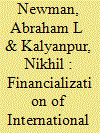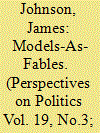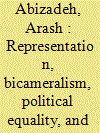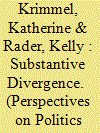|
|
|
Sort Order |
|
|
|
Items / Page
|
|
|
|
|
|
|
| Srl | Item |
| 1 |
ID:
181550


|
|
|
|
|
| Summary/Abstract |
What affects Americans’ sensitivity to international laws and norms on the use of force? A wealth of recent IR literature tackles this question through experimental surveys using fictional scenarios and treatments to explore precisely when Americans would approve of government policies that would violate the laws of war. We test whether such survey experiments may themselves be affecting public sensitivity to these norms—or even Americans’ understanding of the content of the norms themselves. We show that being invited to express a preference regarding war crimes in survey settings has a negative impact on Americans’ understanding of US legal and ethical obligations in war and that reporting previous findings can inflate support for war crimes. We conclude with suggestions for future experimental survey design in international relations and international law.
|
|
|
|
|
|
|
|
|
|
|
|
|
|
|
|
| 2 |
ID:
181549


|
|
|
|
|
| Summary/Abstract |
Replicability in political science is on the rise, as disciplinary journals have been placing a growing emphasis on data access and research transparency (DA–RT) practices and policies. As a result, nearly every article that is published today in leading political science journals offers an online appendix that includes data, code, and methodological explanations necessary for replication. While these developments are laudable, many appendices still do not enable satisfactory replication because they are inaccessible, compartmentalized, and difficult to understand. In this article and in its accompanying online appendix, we demonstrate this problem and make the case for more accessible and comprehensive appendices whose contribution can fulfill and go beyond mere replicability. We propose several ways in which authors and journals can produce better appendices, namely, by making appendices more intuitive, integrated, and standardized, and by choosing an adequate online platform on which to create and host the appendix.
|
|
|
|
|
|
|
|
|
|
|
|
|
|
|
|
| 3 |
ID:
181546


|
|
|
|
|
| Summary/Abstract |
In informal urban areas throughout the developing world, and even in some US and UK neighborhoods, tens if not hundreds of millions of people live under some form of criminal governance. For them, states’ claims of a monopoly on the use of force ring hollow; for many issues, a local criminal organization is the relevant authority. Yet the state is far from absent: residents may pay taxes, vote, and even inform on gangs as punishment for abusive behavior. Criminal governance flourishes in pockets of low state presence, but ones that states can generally enter at will, if not always without violence. It thus differs from state, corporate, and rebel governance because it is embedded within larger domains of state power. I develop a conceptual framework centered around the who, what, and how of criminal governance, organizing extant research and proposing a novel dimension: charismatic versus rational-bureaucratic forms of criminal authority. I then delineate the logics that may drive criminal organizations to provide governance for non-members, establishing building blocks for future theory-building and -testing. Finally, I explore how criminal governance intersects with the state, refining the concept of crime–state “symbiosis” and distinguishing it from neighboring concepts in organized-crime and drug-violence scholarship.
|
|
|
|
|
|
|
|
|
|
|
|
|
|
|
|
| 4 |
ID:
181538


|
|
|
|
|
| Summary/Abstract |
How do representative institutions diffuse from one polity to another? I investigate the effect of the Dominican order on the transition from autocratic to representative city government in medieval Europe. I argue that the order’s practices of representation diffused to local lay politics because of the persistent interaction between Dominican monks and urban elites. Using a difference-in-difference design, I offer evidence that the presence of Dominican houses fostered the development of representative city government. My findings highlight the important role that religious institutions can play in the diffusion of political institutions and principles.
|
|
|
|
|
|
|
|
|
|
|
|
|
|
|
|
| 5 |
ID:
181540


|
|
|
|
|
| Summary/Abstract |
The collapses of the interwar and Bretton Woods monetary regimes have been understood as evidence that international monetary regimes fail when sudden economic shocks destabilize the political coalitions or shared ideas underpinning them. But while these histories are important, other monetary regimes, such as the Sterling Area and Latin Union, disintegrated over long periods of time. If exogenous shocks do not account for varied patterns of destabilization, what does? Using the tools of comparative-historical analysis, I argue that these patterns are the result of strategic choices made by hegemonic powers, choices that are in turn governed by the historical-structural foundations of regimes. From these foundations emerge alternative leadership strategies and membership behaviors responsible for endogenous macro-institutional effects that drive the observed regime trajectories. Regime leaders may establish visibly unequal collective arrangements that maintain their positions but leave a system vulnerable to overt internal resistance and sudden breakdown. Or leaders may reject collective arrangements in order to secretly discriminate among members, slowly building dysfunction into a system, driving its gradual abandonment by members and institutional decline. The analysis both suggests that more equal state power may improve long-run regime performance, and also locates structural vulnerabilities in contemporary regimes.
|
|
|
|
|
|
|
|
|
|
|
|
|
|
|
|
| 6 |
ID:
181541


|
|
|
|
|
| Summary/Abstract |
We investigate how the international investment regime turned into an investment vehicle. Through the process called third-party funding, financiers back international legal claims by firms against countries and in turn seek a share of any potential award. More generally, we add to debates on how international regimes evolve and at times generate unanticipated consequences. Building off work on the sociology of fields, we argue that institutional change can occur when individuals from different fields interact. Each field has its own local practices and beliefs about how governance institutions like international regimes function. When professionals from one field analyze problems in another, they use the tools from their native field. If potential solutions provide material and status benefits for the dominant actors in the targeted regime, cross-field coalitions can form and change the targeted regime’s practice. As hedge funds in the finance field and lawyers in the international law field sought to reinvent themselves after the 2008 financial crisis, they teamed up to make Investor State Dispute Settlement a speculator’s game. Theoretically, we embed theories of regime change within larger social relations, highlighting the importance of informal interactions among regime operators for the use and function of governance institutions. We underscore the role of field interdependence as actors engage in contestation across social and political domains. Empirically, we demonstrate the way in which financialization has had far-reaching consequences that extend well beyond traditional economic sectors, reconfiguring the practice of international law.
|
|
|
|
|
|
|
|
|
|
|
|
|
|
|
|
| 7 |
ID:
181545


|
|
|
|
|
| Summary/Abstract |
In recent years, there has been an explosion of legislative and litigation campaigns to ban conversion therapy for sexual orientation and gender identity. In championing such bans, the American LGBTQ+ advocacy movement has incorporated its massive network of scientific and medical allies into legal arguments, legislative testimonies, educational materials, and political cultural discourse more generally. By linking these recent campaigns to the long history of scientific influence in LGBTQ+ politics, I demonstrate how biomedical and mental health institutions and ideas have become foundational to the character of American LGBTQ+ advocacy. I do so by marrying theories and methodological approaches to studying political identity and social movements, American political development, and public opinion to those in Science and Technology Studies (STS) and biopolitical citizenship studies. This joint perspective reveals both the power of scientific authority as well as the political, legal, and normative pitfalls that attend certain biomedical articulations of identity and personhood, legal rights claims, and demands for full and equal citizenship. This approach demonstrates how scholars might conceptualize and study the role of extra-political institutions and ideas that become constitutive components of minority rights coalitions.
|
|
|
|
|
|
|
|
|
|
|
|
|
|
|
|
| 8 |
ID:
181539


|
|
|
|
|
| Summary/Abstract |
Conventional wisdom holds that landed elites oppose democratization. Whether they fear rising wages, labor mobility or land redistribution, landowners have historically repressed agricultural workers and sustained autocracy. What might change landowning elites’ preferences for dictatorship and reduce their opposition to democracy? Change requires reducing landowners’ need to maintain political control over labor. This transition occurs when mechanization reduces the demand for agricultural workers, eliminating the need for labor-repressive policies. We explain how the adoption of labor-saving technology in agriculture alters landowners’ political preferences for different regimes, so that the more mechanized the agricultural sector, the more likely is democracy to emerge and survive. Our theoretical argument offers a parsimonious revision to Moore’s thesis that applies to the global transformation of agriculture since his Social Origins first appeared, and results from our cross-national statistical analyses strongly suggest that a positive relationship between agricultural mechanization and democracy does in fact exist.
|
|
|
|
|
|
|
|
|
|
|
|
|
|
|
|
| 9 |
ID:
181547


|
|
|
|
|
| Summary/Abstract |
Political scientists invoke the standard rationale to justify making and using formal models. It goes like this: (1) we rely on formal models to generate predictions, (2) we treat these predictions as empirical hypotheses, and (3) we seek to test these hypotheses against evidence derived from the “real world.” I show that this interpretation of formal models as directly empirical is inadequate just insofar as it fails to capture the way we actually use them. I then offer an alternative rationale for making and using formal models. Specifically, I argue that we use models, like we use fables, for conceptual purposes.
|
|
|
|
|
|
|
|
|
|
|
|
|
|
|
|
| 10 |
ID:
181537


|
|
|
|
|
| Summary/Abstract |
Divided societies have long been seen as terrible terrain for democracy. Yet some countries in South and Southeast Asia have managed to overcome ethnic and religious rifts and establish lasting democracy, as in India, while other countries in these regions have seen such deep divisions underpin durable authoritarianism, as in Malaysia. We trace these differences to divergent definitions of the nation that prevailed in struggles for independence and that continue to provide a political resource in ongoing political struggles. Where the national community was defined as inclusive in both ethnoreligious and popular terms, democracy has proven stronger. Alternatively, where the foundational national bargain was more exclusive with respect to salient identity cleavages and popular classes, authoritarianism has been reinforced. Founding types of nationalism not only help explain regime types in India and Malaysia but in countries across southern Asia, offering novel insight into how to understand ongoing battles to shape the nation and the people’s political position within it. In an era of rising nationalist fervor and eroding support for democracy, understanding the conditions under which nationalism either promotes democracy or bolsters authoritarianism is of critical importance to political scientists, activists, and policymakers alike.
|
|
|
|
|
|
|
|
|
|
|
|
|
|
|
|
| 11 |
ID:
181542


|
|
|
|
|
| Summary/Abstract |
The two traditional justifications for bicameralism are that a second legislative chamber serves a legislative-review function (enhancing the quality of legislation) and a balancing function (checking concentrated power and protecting minorities). I furnish here a third justification for bicameralism, with one elected chamber and the second selected by lot, as an institutional compromise between contradictory imperatives facing representative democracy: elections are a mechanism of people’s political agency and of accountability, but run counter to political equality and impartiality, and are insufficient for satisfactory responsiveness; sortition is a mechanism for equality and impartiality, and of enhancing responsiveness, but not of people’s political agency or of holding representatives accountable. Whereas the two traditional justifications initially grew out of anti-egalitarian premises (about the need for elite wisdom and to protect the elite few against the many), the justification advanced here is grounded in egalitarian premises about the need to protect state institutions from capture by the powerful few and to treat all subjects as political equals. Reflecting the “political” turn in political theory, I embed this general argument within the institutional context of Canadian parliamentary federalism, arguing that Canada’s Senate ought to be reconstituted as a randomly selected citizen assembly.
|
|
|
|
|
|
|
|
|
|
|
|
|
|
|
|
| 12 |
ID:
181544


|
|
|
|
|
| Summary/Abstract |
We examine the substantive meaning of public opinion on government spending using open-ended data from an original survey. Belying the conventional wisdom on this subject, we find that public opinion on government spending is not reducible to views on social welfare programs. While most people do have specific associations with spending, in the aggregate, public associations span a wide range of government functions. Balance does not necessarily mean harmony, however. We find strong evidence of what we call substantive divergence along party lines in this area—when they think about spending, Republicans and Democrats envision different bundles of goods and services, on average. This is true even for opposing partisans with the same overall assessment of spending (e.g., those who say government spends too much). These findings bring fiscal conflict into sharper relief and also have broader implications for the conceptualization and measurement of differences across parties, as well as other political cleavages.
|
|
|
|
|
|
|
|
|
|
|
|
|
|
|
|
| 13 |
ID:
181548


|
|
|
|
|
| Summary/Abstract |
Cross-national statistical research based on “all country” data sets involves no deliberate selection and hence ignores the potential for endogenous selection bias. We show that these designs are prone to selection bias if existing units are subject to differential survival rates induced, in part, by treatment. Using rudimentary graph theory, we present survivorship bias as a form of collider bias, which is related to but distinct from selection on the dependent variable. Because collider bias is always relative to a specific causal model, we present a causal model of post-colonial sovereignty on the Arabian Peninsula, show that it implies survivorship bias in the form of false positives with respect to the political resource curse, and provide historical evidence confirming that the model correctly depicts the creation of sovereign countries on the Arabian Peninsula but not elsewhere. When we correct for endogenous selection bias, the effect of oil on autocratic survival is shown to be negligible. The study motivates the need to think more broadly about the nature of the data-generating process when making causal inferences with observational data and to construct statistical models that are sensitive to treatment heterogeneity and rooted in context-specific knowledge and qualitative inferences.
|
|
|
|
|
|
|
|
|
|
|
|
|
|
|
|
| 14 |
ID:
181543


|
|
|
|
|
| Summary/Abstract |
College is a key pathway to political participation, and lower-income individuals especially stand to benefit from it given their lower political participation. However, rising inequality makes college disproportionately more accessible to high-income students. One consequence of inequality is a prevalence of predominantly affluent campuses. Colleges are thus not insulated from the growing concentration of affluence in American social spaces. We ask how affluent campus spaces affect college’s ability to equalize political participation. Predominantly affluent campuses may create participatory norms that especially elevate low-income students’ participation. Alternatively, they may create affluence-centered social norms that marginalize these students, depressing their participation. A third possibility is equal effects, leaving the initial gap unchanged. Using a large panel survey (201,011 students), controls on many characteristics, and tests for selection bias, we find that predominantly affluent campuses increase political participation to a similar extent for all income groups, thus leaving the gap unchanged. We test psychological, academic, social, political, financial, and institutional mechanisms for the effects. The results carry implications for the self-reinforcing link between inequality and civic institutions.
|
|
|
|
|
|
|
|
|
|
|
|
|
|
|
|
|
|
|
|
|